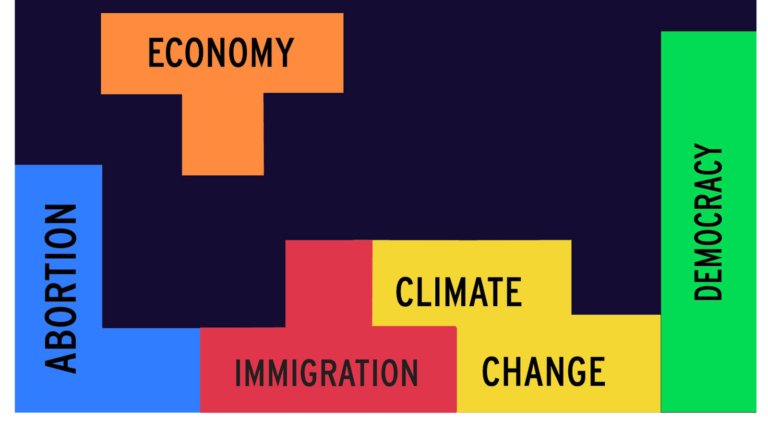One week later, on November 5, tens of millions of Americans will vote to decide whether Kamala Harris or Donald Trump will become the 47th president of the United States. At Michigan State University, students continue to think about their values and positions on a variety of issues as they prepare to vote.
Compared to voters in overwhelmingly liberal or conservative states like California or Texas, Michigan voters realize they live in one of the nation’s most competitive battleground states. There is. The outcome of the election will likely hinge on which party can win Michigan, along with Pennsylvania, Georgia, Arizona and several other key battleground states.
At the same time, college students constitute an important voting bloc that could sway the election in either direction. In 2022, the Michigan Department of Education reported total college enrollment in Michigan at 487,548 students. That population is more than triple Joe Biden’s margin of victory in Michigan in the 2020 election.
Therefore, how students ultimately decide to vote could have an immeasurable impact on the outcome of the election.
Cal Handyside, a sophomore in kinesiology, said he plans to vote but spends his time “telling” his roommates who believe their votes don’t matter. Handyside said he was motivated to vote because of President Trump’s increasingly extreme rhetoric on immigration, beyond his interest in defending abortion rights and preserving the Affordable Care Act. .
“When Donald Trump said immigrants were tainting America’s blood, it was literally Nazi rhetoric,” Handyside said, referring to Trump’s remarks at a 2023 rally. “That’s what Hitler said. It’s shocking that he was allowed to have such a platform.”
For Thomas Kelly, a freshman kinesiology student planning to vote in his home state of Massachusetts, immigration is one of the issues that is prompting him to vote for Trump “at this time.”
“(Massachusetts) has a lot of immigrants, and I think that’s kind of an issue, especially domestically,” Kelly said. “There were murders and assaults and things like that. That’s one of the issues I’m working on.”
Throughout the campaign, Mr. Trump and other Republicans have highlighted violent killings and assaults by illegal immigrants to attack Mr. Biden and Harris as being too soft on crime and illegal immigration. However, national data shows there is little or no association between immigration and crime rates.
Kelly criticized Trump’s “high ego” and reliance on name value, which Kelly said contributed to Trump’s irresponsible comments in person and online.
“I think he talks too much,” Kelly said. “He’s too loud and I think he makes himself look stupid. It reflects poorly on our country.”
Eliza Van Ee, a sophomore majoring in communication sciences and disorders, said she plans to vote for Harris. The reason is that “she cares about people,” and that a second Trump presidency could limit her right as a bisexual woman to “be with whoever I want.” I’m concerned. ” Van Ee also pointed to Trump’s status as a convicted felon and his comments about women of color as factors that discouraged voters from voting for him.
“I don’t like the way he talks about women, the way he talks about people of color. He wants to make the rich richer,” Van Ee said. “He has no interest in creating a more harmonious country.”
Since Harris replaced Biden at the top of the Democratic Party in July, one issue she has consistently struggled with, especially with young people, is the current administration’s handling of the Israel-Hamas war. In the spring, more than 100,000 people voted unopposed in Michigan’s Democratic primary in protest of Biden’s continued support for Israel, but some activists are questioning whether to withhold their votes as an additional protest. It’s still being decided.
Judy Fayed, a second-year finance student, is not eligible to vote because she is a non-citizen, but she expressed sympathy for people who strongly oppose Trump but cannot bring themselves to vote for Harris. Mr. Fayed said Mr. Harris’ pledge to supply arms to Israel was inconsistent with a concurrent promise to address the suffering of the Palestinian people.
“I’m literally an Arab and it’s really sad to see my people killed every day and there’s nothing you can do about it,” Fayed said. “They think, ‘Yeah, we’re going to keep doing it,’ and then they do the whole ‘Oh, we’re going to give aid’ part. Everyone, just shut up.”
However, Fayed pointed out that “the hurdles are hellish” and said he could understand the feelings of those who voted for Harris to prevent Trump’s election.
Polls close next Tuesday, but there’s a good chance the winner of the election won’t be known until days later. For students whose cell phones, emails and televisions are bombarded with political messages, November 5th will at least mark the end of a long and difficult election season.
“I understand the importance (of voting), but my whole feed is just, ‘This politician did this, this politician did this,'” Handyside said. “I’m a little nervous.”
Let’s support student media! Please consider making a donation to State News and help fund the future of journalism.
discussion
Share and discuss “Students think about immigration, abortion and war in Gaza ahead of Election Day” on social media.


